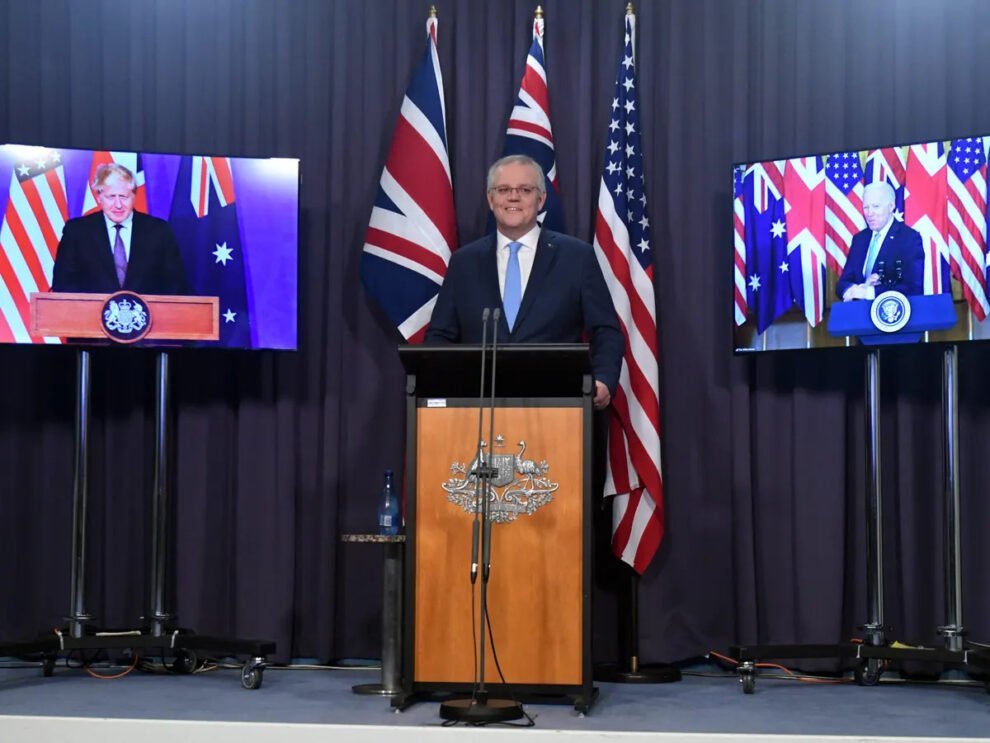People’s Daily Online — According to the website of the British newspaper The Guardian, in early February, US Secretary of Defense Lloyd Austin noted that the US and Australia had made “significant progress” in getting Australia a fleet of nuclear submarines as soon as possible.
Earlier, according to foreign media reports, British and Australian Prime Ministers Rishi Sunak and Anthony Albanese will travel to Washington in mid-March, together with US President Joe Biden, will share the UK and US plan to help Australia build nuclear submarines.
The active promotion of cooperation between the three countries in this area is of increasing concern to the international community.
The US is unable to build submarines
According to Bloomberg, the US, UK and Australia are trading classified military capabilities that will allow Australia to build and deploy new nuclear submarines in the Pacific. This project is part of the Aukus agreement, which was initiated and signed by the three countries in September 2021, and aims to “balance China’s military growth in the Pacific.”According to the signed Aukus agreement, Australia will become the second US ally after Great Britain to receive American technologies for building nuclear submarines. However, over the course of one year, cooperation was not as successful as the countries expected.Professor Wei Zongyu of the Center for American Studies at Fudan University, in an interview with the foreign edition of the People’s Daily newspaper, noted that “at present, while helping Australia create a fleet of nuclear submarines, the United States is facing two obstacles: firstly, US domestic laws severely restrict the export of technology , especially nuclear technology. If the Biden administration wants to transfer nuclear submarine technology to Australia, then it must make the appropriate amendments, a lengthy process in the US Congress. Secondly, the United States has a limited ability to manufacture nuclear submarines, it is even difficult for them to satisfy their own needs. If Washington helps Australia through force, then this may affect the building of the country’s naval power.
Is Australia making or losing money?
The Aukus agreement is facing challenges and criticism from the international community, but the US, UK and Australia remain firmly committed to cooperation on nuclear submarines.According to Wei Zongyu’s analysis, each of the three countries has its own calculations: “with the coming to power, the Biden administration continues to consider China as a “main strategic rival”, believing that the United States should comprehensively prepare, contain the PRC in economic, scientific, technical and military spheres. In the military realm, over the past few years, the US has been creating an “Indo-Pacific version of NATO” in Asia, hoping that US allies in the Asia-Pacific region (APR) will be able to take on more responsibility. This is the essence of the Aukus agreement. The US is using nuclear submarine cooperation as a pretext, but what it really wants is to put Australia at the forefront of the confrontation with China. The UK hopes to take advantage of the Aukus agreement, on the one hand, to pursue the status of a major country – “global Britain” – after leaving the European Union; on the other hand, London hopes to strengthen its presence in the Asia-Pacific region. Over the past few years, Australia has viewed China as a security threat and the island nations in the South Pacific as its backyard, which is why the country considers it necessary to strengthen its own underwater military capabilities.
Chen Hong, President of the Chinese Association of Australian Studies and Director of the Center for Australian Studies at East China Normal University, said in an interview with the media that “Australia is surrounded by seas and has natural barriers. Judging by the strategic environment and security requirements, they do not need nuclear submarines. By joining the Aukus agreement, Australia has placed itself in the awkward position of not only having to pay a high price, paying a huge compensation to France for breaking the submarine contract, but also spending large sums of money to buy the technology and equipment needed for nuclear submarines. In addition, in the face of serious risks caused by tensions in Sino-Australian relations, this step is irrational,Former Australian Prime Minister Paul Keating once said that cooperation in the field of nuclear submarines is fully in the interests of the United States, but cannot satisfy Australia’s military defense needs.Undermining the security order in the Asia-Pacific region“From the point of view of cooperation in the field of nuclear submarines, the Aukus agreement seems to be a significant measure, but its feasibility is not high. At present, amid numerous obstacles at home and abroad, all parties are full of fears about the huge security risks that the agreement will bring to the international community,” said Chen Hong. According to him, the South Pacific region has always been a nuclear-free zone. Equipping with nuclear weapons is extremely dangerous for this region, will undermine security and stability, and also upset the regional balance of power. In the event of a nuclear leak accident, the natural environment on which the existence of the Pacific island states depends will be threatened.
The other day, Chinese Foreign Ministry spokeswoman Mao Ning noted that the United States, Great Britain and Australia should heed the calls of the international community, conscientiously fulfill their obligations on nuclear nonproliferation, abandon the decision to cooperate in the field of nuclear submarines, and take practical actions to maintain peace and security in region and throughout the world.Yusuf Vanadi, co-founder and fellow at the Indonesian Center for Strategic and International Studies, said US-UK-Australia nuclear submarine cooperation puts the region at serious risk of nuclear proliferation.Malaysian Foreign Minister Saifuddin Abdullah said that Malaysia’s negative attitude towards Aukus remains unchanged, the country attaches great importance to peace and security in the ASEAN region.
Source: Russian People










